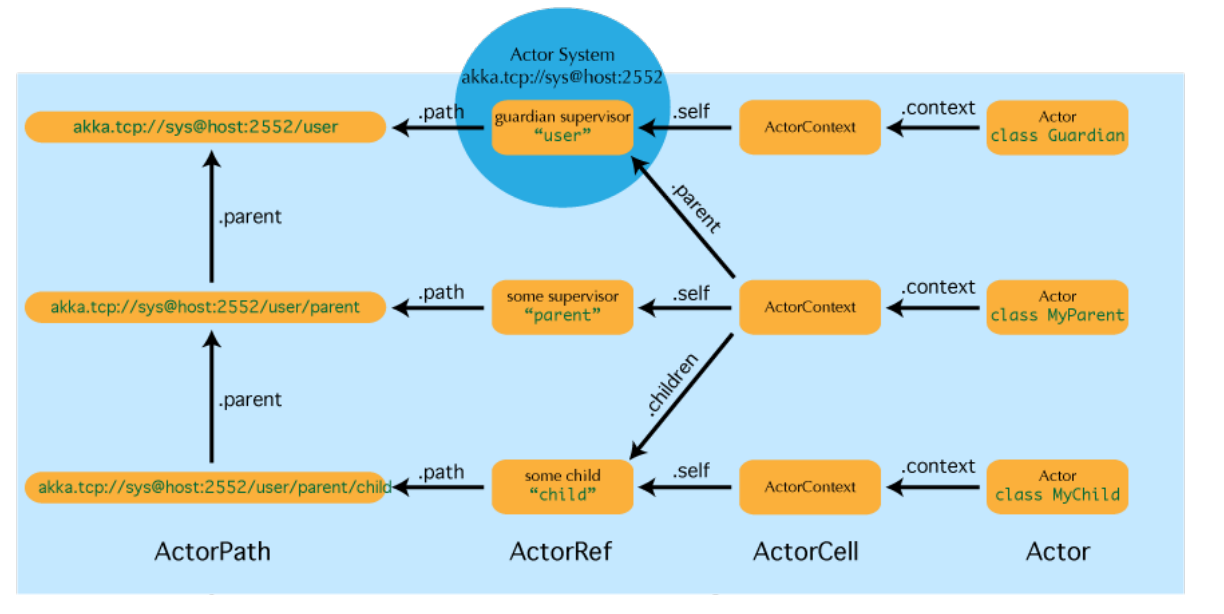1. Actor引用、Actor路径
下图是Akka官方文档中给出的一张图
该图清晰地说明了ActorPath,ActorRef,Actor及ActorSystem之间的关系,并说明了Actor整体的层次结构。前面我们提到,Akka应用程序会持有一个名称为user的Actor,该Actor被称为guardian supervisor(守卫监督器),无论是ActorSystem创建的Actor还是通过ActorContext创建的Actor都为user的子类,它是最顶级的Actor。
(一)ActorRef
对于ActorRef,我们已经很熟悉了,通过调用ActorSystem.actorOf方法可以创建Actor,返回的便是ActorRef,例如代码
//创建FirstActor对象val myactor = system.actorOf(Props[FirstActor], name = "firstActor")
返回的便是FirstActor的ActorRef对象,ActorRef最重要的作用便是向Actor发送消息,例如
//向myactor发送消息myactor!"test"myactor! 123
另外,还可以通过context隐式对象获取父Actor和子Actor的ActorRef,示例代码如下:
/**Actor API:成员变量self及sender()方法的使用*/object Example_07 extends App{import akka.actor.Actorimport akka.actor.ActorSystemimport akka.actor.Propsclass FirstActor extends Actor with ActorLogging{//通过context.actorOf方法创建Actorvar child:ActorRef = _override def preStart(): Unit ={log.info("preStart() in FirstActor")//通过context上下文创建Actorchild = context.actorOf(Props[MyActor], name = "myActor")}def receive = {//向MyActor发送消息case x => child ! x;log.info("received "+x)}}class MyActor extends Actor with ActorLogging{var parentActorRef:ActorRef=_override def preStart(): Unit ={//通过context.parent获取其父Actor的ActorRefparentActorRef=context.parent}def receive = {case "test" => log.info("received test");parentActorRef!"message from ParentActorRef"case _ => log.info("received unknown message");}}val system = ActorSystem("MyActorSystem")val systemLog=system.log//创建FirstActor对象val myactor = system.actorOf(Props[FirstActor], name = "firstActor")//获取ActorPathval myActorPath=system.child("firstActor")//通过system.actorSelection方法获取ActorRefval myActor1=system.actorSelection(myActorPath)systemLog.info("准备向myactor发送消息")//向myActor1发送消息myActor1!"test"myActor1! 123Thread.sleep(5000)//关闭ActorSystem,停止程序的运行system.shutdown()}
代码运行结果
[INFO] [04/02/2016 20:28:08.941] [MyActorSystem-akka.actor.default-dispatcher-4] [akka://MyActorSystem/user/firstActor] preStart() in FirstActor[INFO] [04/02/2016 20:28:08.942] [main] [ActorSystem(MyActorSystem)] 准备向myactor发送消息[INFO] [04/02/2016 20:28:08.943] [MyActorSystem-akka.actor.default-dispatcher-3] [akka://MyActorSystem/user/firstActor] received test[INFO] [04/02/2016 20:28:08.943] [MyActorSystem-akka.actor.default-dispatcher-3] [akka://MyActorSystem/user/firstActor] received 123[INFO] [04/02/2016 20:28:08.943] [MyActorSystem-akka.actor.default-dispatcher-4] [akka://MyActorSystem/user/firstActor/myActor] received test[INFO] [04/02/2016 20:28:08.943] [MyActorSystem-akka.actor.default-dispatcher-4] [akka://MyActorSystem/user/firstActor/myActor] received unknown message[INFO] [04/02/2016 20:28:08.943] [MyActorSystem-akka.actor.default-dispatcher-3] [akka://MyActorSystem/user/firstActor] received message from ParentActorRef[INFO] [04/02/2016 20:28:08.943] [MyActorSystem-akka.actor.default-dispatcher-4] [akka://MyActorSystem/user/firstActor/myActor] received unknown message
代码
class MyActor extends Actor with ActorLogging{var parentActorRef:ActorRef=_override def preStart(): Unit ={//通过context.parent获取其父Actor的ActorRefparentActorRef=context.parent}def receive = {case "test" => log.info("received test");parentActorRef!"message from ParentActorRef"case _ => log.info("received unknown message");}}
中,使用
//通过context.parent获取其父Actor的ActorRefparentActorRef=context.parent
获取MyActor 的直接父Actor的ActorRef,在本例中为FirstActor,因为在FirstActor中,我们使用
//通过context上下文创建Actorchild = context.actorOf(Props[MyActor], name = "myActor")
创建了MyActor,FirstActor便自动成为MyActor的直接Supervisor。如此便可以通过代码
parentActorRef!"message from ParentActorRef"
发送消息。
另外,还可以通过
//创建FirstActor对象val myactor = system.actorOf(Props[FirstActor], name = "firstActor")//获取ActorPathval myActorPath=system.child("firstActor")//通过system.actorSelection方法获取ActorRefval myActor1=system.actorSelection(myActorPath)
system.actorSelection(myActorPath)方法获取相应的ActorRef。然后再使用获取到的ActorRef向Acto发送消息
//向myActor1发送消息myActor1!"test"myActor1! 123
现在,让我们来总结一下获取ActorRef的方法:
(1)通过ActorSystem的actorOf方法,不过这种方式是通过创建Actor,然后返回其ActorRef
(2)通过context.actorOf方法,这种方式也是通过创建Actor,然后返回其ActorRef
(3)通过context.parent、context.self、context.children方法获取当前Actor的父Actor、当前Actor及子Actor的ActorRef,这种方式是获取已经创建好的Actor的ActorRef
(4)通过val myActor1=system.actorSelection(myActorPath)方法来获取ActorRef,这种方式也是获取已经创建好的Actor的ActorRef
(二)ActorPath
在前面的例子中,我们通过
val myActorPath=system.child("firstActor")
已经使用到了ActorPath。在Akka中,ActorPath采用统一资源定位符的方式进行组织,例如
//本地ActorPath"akka://my-sys/user/service-a/worker1"//远程ActorPath"akka.tcp://my-sys@host.example.com:5678/user/service-b"
本地ActorPath是Akka并发编程中的ActorPath表示方式,而远程ActorPath是Akka分布式编程中常用的ActorPath表示方式,”akka.tcp://my-sys@host.example.com:5678/user/service-b”中的TCP表示使用的是TCP协议,也可以使用UPD协议,使用UDP协议的远程ActorPath表示方式有如下形式
"akka.udp://my-sys@host.example.com:5678/user/service-b"
ActorPath当中,akka.udp表示的是使用的协议,my-sys表示的是ActorSytem名称,host.example.com:5678为远程机器地址及端口,user为guardian supervisor,service-b为当前应用程序的顶级Actor(通过system.actorOf方法创建的)
/**ActorPath*/object Example_08 extends App{import akka.actor.Actorimport akka.actor.ActorSystemimport akka.actor.Propsclass FirstActor extends Actor with ActorLogging {//通过context.actorOf方法创建Actorvar child:ActorRef = _override def preStart(): Unit ={log.info("preStart() in FirstActor")//通过context上下文创建Actorchild = context.actorOf(Props[MyActor], name = "myActor")}def receive = {//向MyActor发送消息case x => child ! x;log.info("received "+x)}}class MyActor extends Actor with ActorLogging {def receive = {case "test" => log.info("received test");case _ => log.info("received unknown message");}}val system = ActorSystem("MyActorSystem")val systemLog=system.log//创建FirstActor对象val firstactor = system.actorOf(Props[FirstActor], name = "firstActor")//获取ActorPathval firstActorPath=system.child("firstActor")systemLog.info("firstActorPath--->{}",firstActorPath)//通过system.actorSelection方法获取ActorRefval myActor1=system.actorSelection(firstActorPath)//直接指定其路径val myActor2=system.actorSelection("/user/firstActor")//使用相对路径val myActor3=system.actorSelection("../firstActor")systemLog.info("准备向myactor发送消息")//向myActor1发送消息myActor2!"test"myActor2! 123Thread.sleep(5000)//关闭ActorSystem,停止程序的运行system.shutdown()}
代码运行结果:
[INFO] [04/02/2016 21:04:59.612] [main] [ActorSystem(MyActorSystem)] firstActorPath--->akka://MyActorSystem/user/firstActor[INFO] [04/02/2016 21:04:59.612] [MyActorSystem-akka.actor.default-dispatcher-2] [akka://MyActorSystem/user/firstActor] preStart() in FirstActor[INFO] [04/02/2016 21:04:59.615] [main] [ActorSystem(MyActorSystem)] 准备向myactor发送消息[INFO] [04/02/2016 21:04:59.616] [MyActorSystem-akka.actor.default-dispatcher-4] [akka://MyActorSystem/user/firstActor] received test[INFO] [04/02/2016 21:04:59.616] [MyActorSystem-akka.actor.default-dispatcher-4] [akka://MyActorSystem/user/firstActor] received 123[INFO] [04/02/2016 21:04:59.616] [MyActorSystem-akka.actor.default-dispatcher-3] [akka://MyActorSystem/user/firstActor/myActor] received test[INFO] [04/02/2016 21:04:59.616] [MyActorSystem-akka.actor.default-dispatcher-3] [akka://MyActorSystem/user/firstActor/myActor] received unknown message
本例中的重点代码如下
//获取ActorPathval firstActorPath=system.child("firstActor")systemLog.info("myActorPath--->{}",firstActorPath)//通过system.actorSelection方法获取ActorRefval myActor1=system.actorSelection(firstActorPath)//直接指定其路径val myActor2=system.actorSelection("/user/firstActor")//使用相对路径val myActor3=system.actorSelection("../firstActor")
通过 val firstActorPath=system.child(“firstActor”)构造一个ActorPath,然后使用
val myActor1=system.actorSelection(firstActorPath)
获取路径下的ActorRef,除这种方式外,还可以通过绝对路径 val myActor2=system.actorSelection(“/user/firstActor”)及相对路径 val myActor3=system.actorSelection(“../firstActor”)的方式获取ActorRef
,需要注意的是绝对路径使用的是guardian supevisor,即/user/firstActor的这种方式。如果要获取myActor,则基方法是类型的,例如
//获取ActorPathval myActorPath=system.child("firstActor").child("myActor")systemLog.info("firstActorPath--->{}",myActorPath)//通过system.actorSelection方法获取ActorRefval myActor1=system.actorSelection(myActorPath)//直接指定其路径val myActor2=system.actorSelection("/user/firstActor/myActor")//使用相对路径val myActor3=system.actorSelection("../firstActor/myActor")
完整代码如下:
/**ActorPath,获取myActor*/object Example_09 extends App{import akka.actor.Actorimport akka.actor.ActorSystemimport akka.actor.Propsclass FirstActor extends Actor with ActorLogging{//通过context.actorOf方法创建Actorvar child:ActorRef = _override def preStart(): Unit ={log.info("preStart() in FirstActor")//通过context上下文创建Actorchild = context.actorOf(Props[MyActor], name = "myActor")}def receive = {//向MyActor发送消息case x => child ! x;log.info("received "+x)}}class MyActor extends Actor with ActorLogging{def receive = {case "test" => log.info("received test");case _ => log.info("received unknown message");}}val system = ActorSystem("MyActorSystem")val systemLog=system.log//创建FirstActor对象val firstactor = system.actorOf(Props[FirstActor], name = "firstActor")//获取ActorPathval myActorPath=system.child("firstActor").child("myActor")systemLog.info("firstActorPath--->{}",myActorPath)//通过system.actorSelection方法获取ActorRefval myActor1=system.actorSelection(myActorPath)//直接指定其路径val myActor2=system.actorSelection("/user/firstActor/myActor")//使用相对路径val myActor3=system.actorSelection("../firstActor/myActor")systemLog.info("准备向myactor发送消息")//向myActor1发送消息myActor1!"test"myActor1! 123Thread.sleep(5000)//关闭ActorSystem,停止程序的运行system.shutdown()}
代码运行结果:
[INFO] [04/02/2016 21:21:14.377] [main] [ActorSystem(MyActorSystem)] firstActorPath--->akka://MyActorSystem/user/firstActor/myActor[INFO] [04/02/2016 21:21:14.377] [MyActorSystem-akka.actor.default-dispatcher-2] [akka://MyActorSystem/user/firstActor] preStart() in FirstActor[INFO] [04/02/2016 21:21:14.381] [main] [ActorSystem(MyActorSystem)] 准备向myactor发送消息[INFO] [04/02/2016 21:21:14.382] [MyActorSystem-akka.actor.default-dispatcher-4] [akka://MyActorSystem/user/firstActor/myActor] received test[INFO] [04/02/2016 21:21:14.382] [MyActorSystem-akka.actor.default-dispatcher-4] [akka://MyActorSystem/user/firstActor/myActor] received unknown message
关于远程ActorRef的获取,我们将在后续章节中进行讲述。

